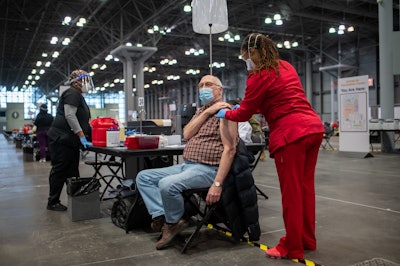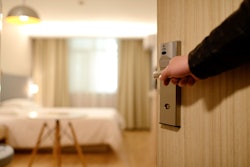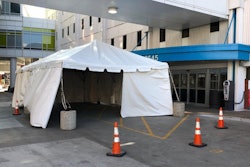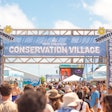
Like many event pros, in March 2020 Dave McGillivray was facing a career crisis. Because of the abrupt shutdown of events due to the COVID-19 pandemic, the owner of Boston-based, 40-year-old event management company DMSE Sports—which manages over 1,400 events including the Boston Marathon, the Goodwill Games, the U.S. Women’s Olympic Marathon Trials and many more race-related events—was forced to pivot.
So McGillivray and his team began producing safe, socially distant events such as drive-in movie screenings and outdoor graduations, as well as managing COVID-19 testing sites.
When winter came and outdoor events evaporated, McGillivray said that he was on the verge of closing his business. But then the vaccines arrived and CIC Health, a division of Cambridge Innovation Center in Cambridge, Mass., offered McGillivray and DMSE Sports the opportunity to handle the operations and logistics management for the Commonwealth’s mass vaccination sites, including at Gillette Stadium (home of the New England Patriots) and Fenway Park (home of the Boston Red Sox).
 Dave McGillivray's DMSE Sports handles the operations and logistics management for mass vaccination sites, including at Gillette Stadium.Photo: Courtesy of DMSE Sports
Dave McGillivray's DMSE Sports handles the operations and logistics management for mass vaccination sites, including at Gillette Stadium.Photo: Courtesy of DMSE Sports
In New York City, the Jacob K. Javits Convention Center, which typically hosts more than 175 events per year, has turned into a 24-hour vaccination center, administering both the Johnson & Johnson one-dose shot and the two-dose Pfizer vaccine. Tony Sclafani, SVP and chief communications officer for the convention center, said that the transformation of the venue into “a vaccination center is an appropriate bookend,” referring back to the early days of the pandemic when Javits served as a temporary field hospital.
He added that the use of the venue as a vaccination site reinforced the importance of these types of facilities to a city, saying that as much as a convention center supports economic growth, it also services the well-being of a community. Sclafani also stressed the need, when setting up a vaccination site, to create an environment that is safe and efficient, as well as comfortable for the patients. “It’s the most important event we could ever host.”
To that end, Sclafani said that a string quartet is now performing on site daily to help keep staff and patients entertained. Plus, the center’s “Wall of Thanks” allows New Yorkers to show their appreciation by posting cards that express their gratitude.
In New England, patients are demonstrating another kind of local love. “Knowing how people, especially here in Boston, are so sports-minded and have sports in their blood, we knew they would be excited to go to one of these locations [Gillette Stadium and Fenway Park] and have their vaccination done, and then take a selfie outside in the stands at Fenway or same thing at Gillette,” McGillivray explained. So his team created on-site selfie stations for folks to capture the moment.
Many vaccination sites across the country have embraced the tried-and-true event staple, as well as stickers with phrases such as “I got vaccinated!” Like most event decor, the social media-friendly, pro-vaccine messaging is simply good branding. "I definitely think that public health swag has some weight," infectious disease epidemiologist Jessica Malaty Rivera told CNN about the positive impact these shareable elements can provide.
The Javits Center had the best single-day performance in the country this past weekend, according to a statement from New York Governor Andrew M. Cuomo. The site administered 13,431 doses over a 24-hour period on Saturday and Sunday, and 13,713 doses over a 24-hour period on Sunday and Monday, totaling more than 27,000 doses over a 48-hour period.
McGillivray said that Gillette Stadium is now administering over 6,000 vaccinations a day, and about 200,000 people have been vaccinated across all of the Commonwealth’s sites.
The next mass vaccination site in Massachusetts will be at the Hynes Convention Center—an apropos venue for McGillivray. “It's ironic that we use the Hynes and have used the Hynes for years and years and years. [It’s] where we host the Boston Marathon Expo and we hand out runners’ bib numbers,” McGillivray explained. He pointed out that typically the Boston Marathon takes place in mid-April, but it’s been postponed this year until October. “It's going to be somewhat surreal that we're going to be in there handing out vaccines instead of handing out bib numbers, but it's going to be the same building at the exact same time.”
McGillivray compares the conception and execution of a mass vaccination site to the planning of any large-scale event like a marathon. “If this [building] was full of people, how would I get them from point A to point B? You just have to start imagining it in your own mind and having a sense for crowd flow and spacing and time—all of that.”
One of the biggest challenges for McGillivray and his team is adjusting to the ever-changing situation, taking into account the state’s fluctuating guidelines and vaccine distribution timeline.
“It's like putting on a race. If you had a race with 500 people in it and you’re used to doing 500 people and then all of a sudden it jumped to 2,000, it's a whole new ballgame,” he explained. “So every time [the demand] bumps up, you need more tables and you need more chairs, you need more supplies, you need more vaccinators, you need more space. ... But we're putting more shots in arms, so the end result is a good thing.”
 New York's Jacob K. Javits Convention Center is one of many convention centers around the country that have been converted into mass vaccination sites.Photo: Courtesy of Jacob K. Javits Convention Center
New York's Jacob K. Javits Convention Center is one of many convention centers around the country that have been converted into mass vaccination sites.Photo: Courtesy of Jacob K. Javits Convention Center
 The Javits Center had the best single-day performance in the country this past weekend, according to a statement from New York Governor Andrew M. Cuomo. The site administered 13,431 doses over a 24-hour period on Saturday and Sunday, and 13,713 doses over a 24-hour period on Sunday and Monday, totaling more than 27,000 doses over a 48-hour period.Photo: Courtesy of Jacob K. Javits Convention Center
The Javits Center had the best single-day performance in the country this past weekend, according to a statement from New York Governor Andrew M. Cuomo. The site administered 13,431 doses over a 24-hour period on Saturday and Sunday, and 13,713 doses over a 24-hour period on Sunday and Monday, totaling more than 27,000 doses over a 48-hour period.Photo: Courtesy of Jacob K. Javits Convention Center
 The Javits Center, which typically hosts more than 175 events per year, has turned into a 24-hour vaccination center.Photo: Courtesy of Jacob K. Javits Convention Center
The Javits Center, which typically hosts more than 175 events per year, has turned into a 24-hour vaccination center.Photo: Courtesy of Jacob K. Javits Convention Center
 Sclafani said that the transformation of the venue into “a vaccination center is an appropriate bookend,” referring back to the early days of the pandemic when Javits served as a temporary field hospital.Photo: Courtesy of Jacob K. Javits Convention Center
Sclafani said that the transformation of the venue into “a vaccination center is an appropriate bookend,” referring back to the early days of the pandemic when Javits served as a temporary field hospital.Photo: Courtesy of Jacob K. Javits Convention Center



















